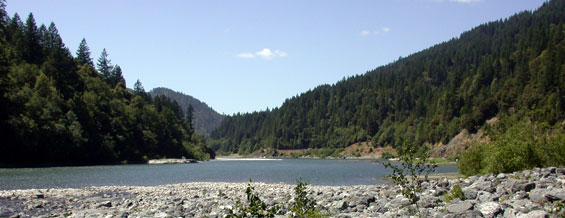Project Members
- Juliette Blevins
- Andrew Garrett (University of California at Berkeley)
- and many others
Yurok Language Project

The Yurok language is spoken in northwestern California, as it has been spoken for
centuries, along the Klamath River from Wechpus (Weitchpec) to Rek'woy (Requa) and south along the Pacific coast to Churey (Trinidad). Neighboring languages include Tolowa, Wiyot, Chilula, Hupa, and Karok. Yurok is a Karok word for "downriver" people. The Yuroks call themselves 'oohl 'people'. At the time of first European contact in the nineteenth century, the Yurok language had several thousand speakers. Today there are less than a dozen native speakers, all elderly, and an active language revitalization program.
Yurok is related to its neighbor Wiyot, and both are distantly related to the Algonquian language languages spoken across central and eastern North America. The Algonquian language family includes Blackfoot, Cree, Lenape, Micmac, Mohican, Ojibwe, and many others. Linguists believe that all these languages descend from a single common ancestor spoken thousands of years ago, perhaps somewhere in present-day eastern Washington, Oregon or northern Idaho. The relations and history of these languages are areas of active research among linguists, archaeologists, and historians.
The Yurok Language Project was started in 2001 with a generous grant from the National Science Foundation to Juliette Blevins and Andrew Garrett. Continuing support has been provided by The University of California, Berkeley, and the Max Planck Institute for Evolutionary Anthropology. The goals of the project included language documentation, language archiving, and language description, including the creation of teaching and learning materials. Through fieldwork with fluent native speakers — recording grammatical material, words, and texts — as well as philological analysis of earlier fieldnotes and recordings, the team sought to develop a documentary corpus of Yurok that would be as comprehensive as possible and would contribute as much as possible to understanding the complexities of the Yurok language. New and older work on Yurok was also brought together into a single digital archive — incorporating material from as early as 1850 to the present day — and it is made available on the project website whenever possible and appropriate.
The project team contributed language-learning material and offers workshops for Yurok language revitalization programs. These programs included formal classes in public schools, community language classes, summer camps, and other activities sponsored by the Yurok Tribe language office and by community groups such as the Yurok Elder Wisdom Preservation Project. An on-line and printed dictionary have been created for use by Yurok speakers. Long-term goals included a comprehensive reference grammar, a full dictionary with examples from texts, and editions of Yurok-language narrative and other prose texts. For further details including a complete list of scholarly and other publications, please see the Project website. Wokhlew!
Some Language Learning Materials
Andrew Garrett, Juliette Blevins, and Lisa Conathan, Preliminary Yurok Dictionary (2005)
Juliette Blevins, Teacher Training for Yurok Pre-School Settings: Workshop for the Yurok Tribe (2003)
Aileen Figueroa and Juliette Blevins, Nee-kwech, Nee-kwech, Tee' Nee' Sho Ney-woo'm? (2003)
Some Research Papers
Juliette Blevins and Andrew Garrett, "The Rise and Fall of l Sandhi in California Algic" International Journal of American Linguistics 73 (2007) 72-93.
Juliette Blevins, "Yurok Verb Classes", International Journal of American Linguistics 71 (2005) 327-349.
Juliette Blevins, "The Phonology of Yurok Glottalized Sonorants: Segmental Fission Under Syllabification", International Journal of American Linguistics 69 (2003) 371-396
Contact Information
Yurok Language Project
Department of Linguistics
University of California
1203 Dwinelle Hall #2650
Berkeley, CA 94720-2650, USA
Our work has been supported by National Science Foundation under grant BCS-0004081 to the University of California, Berkeley, and by the University of California and the Max Planck Institute for Evolutionary Anthropology, Leipzig.